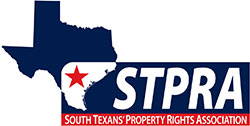EMINENT DOMAIN
THE ISSUE
A portion of the 5th amendment of the U.S. Constitution, often called the takings clause, prohibits the taking of private property for “a public purpose” without just compensation to the property owner. Historically, the 14th amendment of the U.S. Constitution has been interpreted as making this standard applicable to the states. Section 17, Article 1 of the Texas Constitution prohibits a person’s land from being “taken, damaged, or destroyed” for public use without consent or adequate compensation.
In 2005, the U.S. Supreme Court, by a 5-4 vote, issued a ruling that a public entity is justified in condemning private property for the sake of furthering “economic development”, even if the beneficiary is another private entity. Justice Sandra Day O’Connor, an Arizona rancher born in Texas, wrote in her dissent that the majority’s decision eliminates “any distinction between public and private use of property”. This case, known commonly as the Kelo decision, alerted both states and property owners to the potential abuses by governmental authorities in their execution of eminent domain powers.
POSITION
Largely in response to the Kelo decision, property rights groups in Texas, led by the Farm Bureau, initiated a grassroots campaign to extend the scope and definition of private property protection that is described by statute. As a result of that effort, the 2007 Texas legislature overwhelmingly passed a strong bill to protect private property rights in eminent domain proceedings. STPRA participated in the process by being the point of contact with the South Texas legislative delegation. However, perhaps in fear of harming the then-planned Trans-Texas Corridor, the Governor vetoed the legislation.
The Farm Bureau, STPRA, and other property rights groups, including the Texas Wildlife Association and the Texas and Southwestern Cattle Raisers Association, resolved to promote similar legislation in the 2009 legislative session and to do it soon enough to allow an over-ride of a gubernatorial veto. Unfortunately, the 2009 version of the 2007 bill never made it out of the session.
What did pass the legislature in 2009 was a proposed Texas constitutional amendment, Proposition 11, which was overwhelmingly approved by voters on November 3, 2009. This amendment more clearly defines the public purposes for which eminent domain authority can be used. STPRA supported passage of Prop. 11, however, the amendment is too general to fully define the conditions, circumstances, and procedures under which condemning authorities can use their powers of eminent domain.
As mentioned, STPRA, in concert with the Farm Bureau and other allies on the Ag Council, played an integral part in passing legislative reform of eminent domain in 2007. In the 2009 and 2011 sessions, STPRA contributed to the cause through communications with legislators and testimony before committees, but those efforts failed in 2009. In 2011, S.B. 18 was finally successful in codifying the following provisions:
- Requiring a public vote of an elected body before eminent domain proceedings can be initiated
- Demanding that a bona fide offer be made based on market value
- Requiring due process and the release of information in condemnation and compensation proceedings
- Allowing repurchase of the property by the original owner at the original price he/she was paid if the use for which the property was condemned is not begun before the 10th anniversary of its purchase
- Stipulating that compensation value should be determined by taking into account any diminished access to the remaining property
FUTURE ACTIONS
This session, the Legislature failed to pass legislation to comply with the “Denbury” Supreme Court decision that stated that pipelines must document their common carrier status. STPRA will continue working with its allies to address outstanding issues related to “necessity of public use” definitions and the prevention of abuses by power and fuel line companies.
